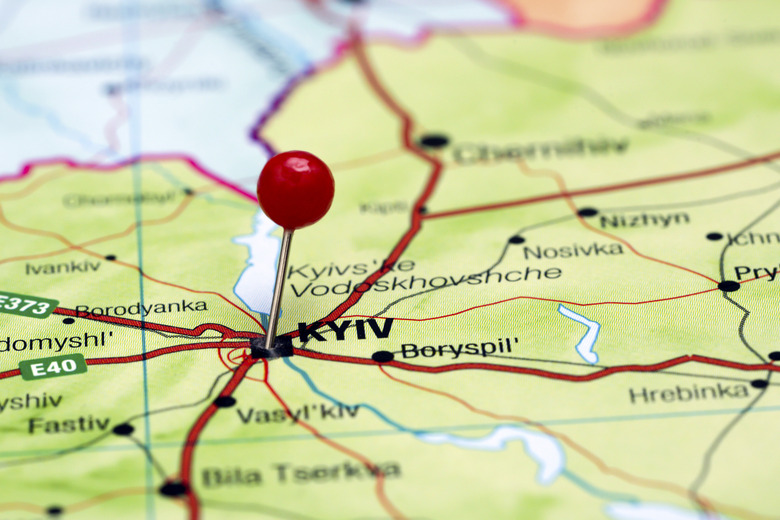How To Convert Eastings And Northings
If your studies cover civil engineering or surveying, you'll have plenty of time to get used to eastings and northings. Eastings and northings are simply x and y coordinates, just as you'd use on a graph – but they can be overlaid on different coordinate systems as a way of designating specific places on the Earth's surface. Most frequently, eastings and northings are used with either Universal Transverse Mercator (UTM) coordinates or the simpler State Place Coordinate System, or SPCS.
Eastings and Northings Are Coordinates
Eastings and Northings Are Coordinates
If you've ever used the x,y or Cartesian coordinate system, then you're already familiar with the basic concept of northings and eastings. Eastings correspond with the x values in the Cartesian coordinate system; that's easy to remember if you think of a compass rose oriented so that north is straight up, and then notice that the east/west axis will run "horizontally" left and right – just like the x axis in a graph.
Similarly, northings correspond with the y values in the Cartesian coordinate system, or the north/south "vertical" line in that compass rose. But there's more than one coordinate system for designating specific places on the Earth's surface. So before you can use northings and eastings correctly, you need to know which coordinate system you're using them with.
The State Place Coordinate System
The State Place Coordinate System
In the United States, the two most common coordinate systems you're likely to use northings and eastings with are UTM coordinates and SPCS coordinates. The SPCS or State Plane Coordinate System is the simplest of these two, so let's take a look at it first.
The SPCS system is literally a Cartesian graph or grid system – but its origin is located in such a way that the primary area being measured is always located in quadrant I of the graph, or the area where both x and y values are positive. That means that different states, and even different counties, have the origin of their coordinate plane at a different place on the Earth. For example, the origin of Oregon's SPCS is in the Pacific Ocean, far enough south that the entirety of the state is in Quadrant I.
Universal Transverse Mercator Coordinates
Universal Transverse Mercator Coordinates
The Universal Transverse Mercator or UTM coordinate system divides the Earth into a series of 60 wedges – think the slices of an orange – called zones. If you then "flatten" each of those wedges you get the UTM projection, which is one of the most common map projections in use today.
In order to use northings and eastings with UTM coordinates, you need to know two things: First, which of those 60 zones you're in; and second, where you are in relation to the central meridian of the zone and where you are in relation to the equator.
That's because UTM coordinates use "false" easting and northing. Instead of designating an arbitrary origin for the coordinate system, they designate the central meridian of that zone as having a "value" of 500,000 meters; this allows coordinates both to the west of that meridian and to the east of the meridian to be positive, because by the time you've gone far enough west for your positive numbers to "run out," you're in a zone.
Similarly, the equator is designated with a northing (or y) value of 0 meters if you're in the Northern Hemisphere, or 10,000,000 meters if you're in the Southern Hemisphere. That allows all northing values in your respective hemisphere to always be positive, too.
You Can Use a Lat Long Converter
You Can Use a Lat Long Converter
You may be asked to convert from northings/eastings into latitude and longitude, or lat long, coordinates. The easiest way of doing is this is with an online lat long converter; see Resources for an example of a versatile system that supports many coordinate systems, including UTM coordinates and SPCS.
Cite This Article
MLA
Maloney, Lisa. "How To Convert Eastings And Northings" sciencing.com, https://www.sciencing.com/convert-eastings-northings-6540636/. 26 November 2018.
APA
Maloney, Lisa. (2018, November 26). How To Convert Eastings And Northings. sciencing.com. Retrieved from https://www.sciencing.com/convert-eastings-northings-6540636/
Chicago
Maloney, Lisa. How To Convert Eastings And Northings last modified March 24, 2022. https://www.sciencing.com/convert-eastings-northings-6540636/
